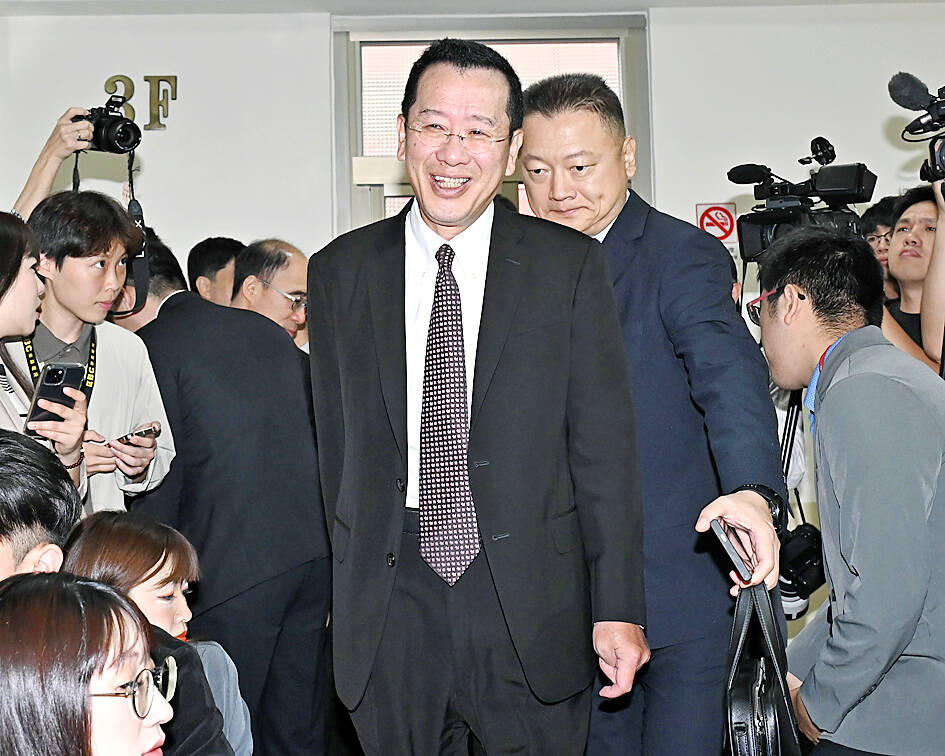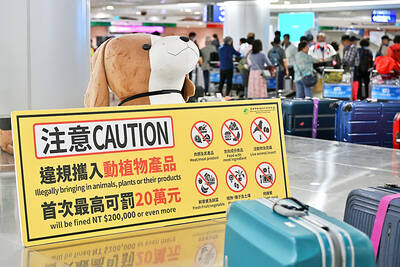The military would be ordered to exercise the right of self-defense if the Chinese People’s Liberation Army (PLA) attacks Taiwan or its outlying islands, or enters without permission within 12 nautical miles (22.2km) of its territorial airspace and waters, Minister of National Defense Wellington Koo (顧立雄) told lawmakers yesterday.
Koo, who was head of the National Security Council under former president Tsai Ing-wen (蔡英文), gave briefings to lawmakers at the meeting of the legislature’s Foreign and National Defense Committee for the first time after being sworn in on May 20.
He is the nation’s seventh defense minister without a military background.

Photo: Tu Chien-jung, Taipei Times
During the question-and-answer session, Chinese Nationalist Party (KMT) legislators Huang Jen (黃仁) and Wang Hung-wei (王鴻薇) inquired about the ministry’s definitions of “first strike” and the right of defense.
Koo said that the military would be ordered to exercise the right of defense if the PLA launches a first strike against Taiwan or its outlying islands, or its facilities, aircraft and sea vessels in operation.
“The right of self-defense would also be invoked if any Chinese aircraft enters within 12 nautical miles of our territorial airspace and waters, and the military should defend and respond in proportion to the size of the attack,” Koo said.
Wang also asked how the military obtained information about China’s “Joint Sword-2024A” military exercise on May 23 and 24, and whether its assessment showed that more military exercises are expected in the second half of the year.
Koo said he cannot say how the military secured information about the exercise, but it forms assessments based on various signs.
“Our military has always been able to obtain the updated status of the PLA, but there is no telling whether they would hold another exercise. We will closely monitor the situation,” he said.
Meanwhile, Koo said that the ministry has lifted travel restrictions imposed on active military personnel.
Although military personnel were not banned from traveling overseas, they were required to join group tours to ensure their safety and prevent them leaking confidential national security information.
Democratic Progressive Party Legislator Hung Sun-han (洪申翰) on Facebook wrote that such travel restrictions are meaningless as there is no mechanism to verify whether military personnel would only join group tours.
More than 180,000 military personnel in the past few decades were subject to the restriction, including doctors and nurses in military hospitals or faculty members and instructors in military academies or colleges who do not teach subjects related to national intelligence, Hung said.
Based on the revised regulations announced by the ministry on Wednesday, military personnel are allowed to travel independently as long as they provide a detailed itinerary, including flights and accommodation.
They must present documents proving that they had traveled overseas when they return, such as a photocopy of their passports with arrival and departure stamps, boarding passes or documents provided by hotels.
If military personnel join group tours, they must present travel itineraries and a copy of their travel service contract, the regulations say.
Koo also said that military personnel with intelligence clearing would be regulated based on the level of confidential information to which they have access, rather than on their rank.
The policy is to be changed after consulting with the US military system, he said.
In addition, the ministry has relaxed a policy that bans chiefs of military units and their deputies from leaving their barracks at the same time, Koo said.
“The requirement was previously set because of frequent harassment from Chinese military aircraft,” Koo said.
“However, the military has a well-established chain of command and accumulated experiences. Following detailed discussions about the issue, we have decided to return to the normal division of labor between unit chiefs and deputies so military personnel at all levels can take care of their families as well,” he said.
Food stipends for military personnel of all levels would increase, he added.

UKRAINE, NVIDIA: The US leader said the subject of Russia’s war had come up ‘very strongly,’ while Jenson Huang was hoping that the conversation was good Chinese President Xi Jinping (習近平) and US President Donald Trump had differing takes following their meeting in Busan, South Korea, yesterday. Xi said that the two sides should complete follow-up work as soon as possible to deliver tangible results that would provide “peace of mind” to China, the US and the rest of the world, while Trump hailed the “great success” of the talks. The two discussed trade, including a deal to reduce tariffs slapped on China for its role in the fentanyl trade, as well as cooperation in ending the war in Ukraine, among other issues, but they did not mention

Japanese Prime Minister Sanae Takaichi yesterday lavished US President Donald Trump with praise and vows of a “golden age” of ties on his visit to Tokyo, before inking a deal with Washington aimed at securing critical minerals. Takaichi — Japan’s first female prime minister — pulled out all the stops for Trump in her opening test on the international stage and even announced that she would nominate him for a Nobel Peace Prize, the White House said. Trump has become increasingly focused on the Nobel since his return to power in January and claims to have ended several conflicts around the world,

REASSURANCE: The US said Taiwan’s interests would not be harmed during the talk and that it remains steadfast in its support for the nation, the foreign minister said US President Donald Trump on Friday said he would bring up Taiwan with Chinese President Xi Jinping (習近平) during a meeting on the sidelines of the APEC Summit in South Korea this week. “I will be talking about Taiwan [with Xi],” Trump told reporters before he departed for his trip to Asia, adding that he had “a lot of respect for Taiwan.” “We have a lot to talk about with President Xi, and he has a lot to talk about with us. I think we’ll have a good meeting,” Trump said. Taiwan has long been a contentious issue between the US and China.

Taiwan’s first African swine fever (ASF) case has been confirmed and would soon be reported to the World Organization for Animal Health (WOAH), Minister of Agriculture Chen Junne-jih (陳駿季) yesterday. The Ministry of Agriculture’s Veterinary Research Institute yesterday completed the analysis of samples collected on Tuesday from dead pigs at a hog farm in Taichung and found they were ASF-positive. Animal and Plant Health Inspection Agency Animal Quarantine Division chief Lin Nien-nung (林念農) said the result would be reported to the WOAH and Taiwan’s major trade partners would also be notified, adding that pork exports would be suspended. As of Friday, all samples